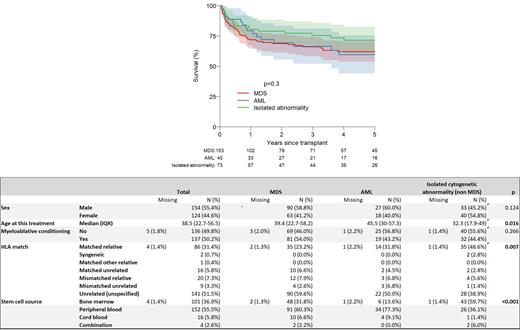Introduction
Clonal evolution into myelodysplastic syndromes (MDS) or acute myeloid leukemia (AML) is the most concerning late event among non-transplanted acquired aplastic anemia (AA) or paroxysmal nocturnal hemoglobinuria (PNH) patients, occurring in nearly 10% of cases. MDS/AML secondary to AA differ from primary MDS/AML, presenting with higher risk cytogenetics and poorer prognosis, usually involving abnormalities in chromosome 7 (Gurnari C. et al., JCO 2023). The survival is poor, and the only curative treatment is allogeneic hematopoietic stem cell transplantation (HSCT). We present the HSCT outcomes of secondary MDS/AML following AA/PNH.
Methods
We have extracted data from the EBMT database for patients with AA or PNH diagnosed after 2010, who later presented a clonal evolution into AML, MDS, or isolated cytogenetic abnormality insufficient for MDS diagnosis according to WHO 2016 classification, who have undergone HSCT after the clonal evolution diagnosis. We have excluded AA/PNH patients with HSCT before clonal evolution, inherited bone marrow failure syndromes, and non-transplanted patients. Our primary objective was to describe the overall survival (OS). The secondary aims were transplant outcomes according to clonal evolution category and conditioning regimen intensity.
Results:
We have studied 278 patients from 114 different EBMT centers, 250 patients diagnosed with AA, and 28 with classical PNH. The median age at AA/PNH diagnosis was 34.7 (20.5-51.7) years.
At first evolution, 153 (56.5%) patients had a diagnosis of MDS, 45 (16.6%) AML, and 73 (26.9%) isolated abnormal cytogenetics insufficient for a diagnosis of MDS (missing data for 7 patients). The median interval from AA/PNH diagnosis to clonal evolution was 30.1 (8.1-67) and 39.8 (21.5-82.6) months for MDS and AML, respectively. The interval from clonal evolution to HSCT was 5 (3-10.2) and 3.4 (2.3-5.1) months for MDS and AML, respectively.
We present transplant characteristics in Table 1. With a median follow-up of 5 (4.3 - 5.9) years, the 5-year overall survival (OS) was 65% for the entire cohort. A subgroup analysis did not find a significant 5-year OS difference among groups: 73, 62, and 60% for isolated cytogenetic abnormality, MDS, and AML, respectively (p=0.3, Figure 1). The main causes of death were transplant-related toxicities (66.7% and 75% for isolated cytogenetic abnormality and MDS, respectively) and relapse or progression for AML (43.8%).
AML patients relapsed more frequently than MDS patients by 5 years [cumulative incidences of 22 (9-35) vs. 10% (4-17) for AML and MDS (p=0.046), respectively]. The 5-year non-relapse mortality (NRM) was 19 (7-31) and 28% (19-36) for AML and MDS patients, respectively (p=0.3). When stratifying by conditioning regimen intensity, the 5-year NRM was 34% (19-40) for myeloablative (MAC) vs. 18% (9-26) for reduced-intensity (RIC, p=0.025), with similar incidence of relapse in both groups (4 vs 10% for MAC and RIC, respectively, p=0.2).
AML patients were more prone to have presented acute graft-versus-host disease (GvHD) by day+100 than MDS or isolated cytogenetic abnormality patients (cumulative incidences of 36, 26, and 14% respectively, p=0.022). Likewise, AML patients had more chronic GvHD (43, 28, and 12% respectively, p=0.008). Graft-failure, GvHD, relapse-free survival (GGRFS) was 71 (61-82), 60 (51-68), and 45% (29-60) for isolated abnormality, MDS, and AML, respectively (p=0.026).
Discussion
This study is the largest cohort of transplanted patients with secondary MDS/AML following AA/PNH. The major limitations of our study are its retrospective nature, non-adjusted analyses, and missing data on complete cytogenetics. We found a 5-year OS higher than 60% for MDS/AML compared to 45% in the previously published EBMT study (Hussein A. et al., BBMT 2014) and did not find a survival difference between AML and MDS. Interestingly, the main cause of death for MDS patients was HSCT complications. Furthermore, MAC was also associated with a higher NRM. Clinicians should indicate HSCT with discretion for post-AA/PNH MDS or isolated cytogenetic abnormality, considering the transplant toxicity, especially with MAC, and the risk of primary disease progression. For patients with AML and a high risk of relapse, early tapering of immunosuppressive agents and post-transplant maintenance, such as hypomethylating agents and donor lymphocyte infusion, should be considered.
Disclosures
Kulasekararaj:Samsung: Consultancy; Amgen: Honoraria, Membership on an entity's Board of Directors or advisory committees; Celgene/BMS: Consultancy, Honoraria, Membership on an entity's Board of Directors or advisory committees; Novartis: Consultancy, Honoraria, Membership on an entity's Board of Directors or advisory committees; Akari Therapeutics: Consultancy; F. Hoffmann-La Roche Ltd: Consultancy, Membership on an entity's Board of Directors or advisory committees; BioCryst: Consultancy; Achillion: Consultancy; Alexion, AstraZeneca Rare Disease: Consultancy, Honoraria, Membership on an entity's Board of Directors or advisory committees. Chevallier:Incyte: Honoraria, Research Funding; Sanofi: Honoraria; Mallinckrodt Pharmaceuticals: Honoraria; Takeda: Honoraria; Immedica Pharma: Honoraria; Servier: Honoraria. Platzbecker:Merck: Research Funding; Fibrogen: Research Funding; Jazz: Consultancy, Honoraria, Research Funding; Syros: Consultancy, Honoraria, Research Funding; Servier: Consultancy, Honoraria, Research Funding; Silence Therapeutics: Consultancy, Honoraria, Research Funding; Takeda: Consultancy, Honoraria, Research Funding; Celgene: Honoraria; MDS Foundation: Membership on an entity's Board of Directors or advisory committees; Janssen Biotech: Consultancy, Research Funding; Geron: Consultancy, Research Funding; Curis: Consultancy, Research Funding; AbbVie: Consultancy; Novartis: Consultancy, Honoraria, Research Funding; Bristol Myers Squibb: Consultancy, Honoraria, Membership on an entity's Board of Directors or advisory committees, Other: travel support; medical writing support, Research Funding; Amgen: Consultancy, Research Funding; Roche: Research Funding; BeiGene: Research Funding; BMS: Research Funding. Kröger:Jazz: Honoraria; MSD: Honoraria; Neovii Biotech: Honoraria, Research Funding; Novartis: Honoraria, Research Funding; Pfizer: Honoraria; BMS: Honoraria, Research Funding; Kite/Gilead: Honoraria; Riemser: Honoraria, Research Funding; Takeda: Consultancy; Sanofi: Honoraria. Finke:Neovii: Honoraria, Research Funding, Speakers Bureau; Roche: Current holder of stock options in a privately-held company; AbbVie: Current holder of stock options in a privately-held company; Gilead Sciences: Current holder of stock options in a privately-held company; Riemser: Honoraria, Research Funding, Speakers Bureau; Medac: Honoraria, Research Funding. Risitano:F. Hoffmann-La Roche Ltd: Consultancy, Honoraria, Research Funding; Novartis: Consultancy, Honoraria; Alexion, AstraZeneca Rare Disease: Consultancy, Honoraria, Research Funding. Peffault De Latour:Jazz Pharmaceuticals: Honoraria.


This feature is available to Subscribers Only
Sign In or Create an Account Close Modal